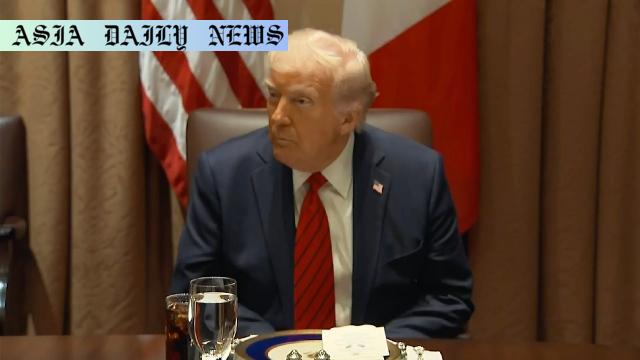Trade Deals: Trump emphasizes no rush in reaching agreements during strategic discussions with Italy and Japan.
Trump states there is ‘no rush’ to finalize trade agreements.
Discussions focused on alliances with Italy and Japan on economic topics.
Trade agreements highlight strategic global economic negotiations.

Trump’s Strategic Delay in Trade Deals
President Donald Trump recently reiterated his administration’s stance on global trade agreements, stating there is ‘no rush’ to finalize deals. This declaration came during a meeting with Italian Prime Minister Giorgia Meloni at the White House, which followed high-level discussions with Japan’s Economic Revitalization Minister Akazawa Ryosei. Trump’s comments reflect a calculated approach to U.S. trade strategies, focusing on aligning economic benefits with national interests.
Highlights from Talks with Italian and Japanese Leaders
In discussions with Italian Prime Minister Giorgia Meloni, Trump touched on the importance of collaboration between allies in shaping international trade policies. Italy, as a key European partner, plays a pivotal role in economic ties with the U.S., making these talks significant in fostering bilateral relations. Meanwhile, Trump’s meeting with Akazawa Ryosei reaffirmed the ongoing progress of trade negotiations with Japan. The administration aims to address tariffs and other trade barriers while advancing favorable terms for American industries.
Strategic Messaging: Balancing Global Interests
Beyond individual meetings, Trump’s broader trade rhetoric underscores the administration’s focus on methodical negotiations. By emphasizing that every nation, including China, is eager to engage, Trump signals to domestic and international audiences that the U.S. holds substantial economic leverage. His Truth Social post citing ‘Every Nation, including China, wants to meet!’ encapsulates this sentiment, portraying the U.S. as a dominant force in global trade.
Implications of the ‘No Rush’ Approach
While the ‘no rush’ approach may appear as a delay, analysts suggest it reflects tactical patience, giving the administration time to craft advantageous terms. This strategy could prove beneficial in fostering long-term economic stability and ensuring U.S. supremacy in trade relationships. However, critics warn that prolonged discussions might cause uncertainty for businesses relying on a clear trade framework. Balancing urgency with strategic deliberation remains a challenge for Trump’s administration.
As the U.S. proceeds with these negotiations, the world watches closely. Trump’s deliberate pace and focus on achieving beneficial outcomes underline a shift in global trade dynamics. With Italy, Japan, and potentially other nations on board, the results of these discussions could redefine economic partnerships for years to come.
Commentary
The Art of Strategic Patience
President Trump’s statement about being in ‘no rush’ to conclude trade agreements offers a noteworthy perspective on international negotiations. While some may perceive this approach as a delay, it signals a strategy grounded in calculated patience. Trump’s emphasis on aligning trade deals with American interests reflects his larger economic policies aimed at rebalancing international markets and reinforcing U.S. dominance on the global stage.
Shaping Long-Term Economic Partnerships
The discussions with Italian and Japanese leaders underscore the importance of fostering strong bilateral relationships in an increasingly interconnected world. Italy, as a core member of the European Union, and Japan, a leading player in Asia, share common goals with the U.S. in promoting economic growth and addressing global challenges. These ongoing talks highlight the administration’s intent to align economic objectives with its allies while preparing for broader trade partnerships, including with China.
Impacts of a Measured Approach
Trump’s strategic messaging about how ‘every nation’ wants to engage with the U.S. reflects confidence in the country’s economic leverage. However, the ‘no rush’ stance could also introduce uncertainties for industries reliant on stable trade policies. While deliberate negotiations are vital for achieving favorable terms, timely resolutions are equally indispensable for ensuring economic continuity and business confidence. The challenge lies in balancing these competing priorities effectively.
A Watchful World
As global trade agreements evolve, the world closely observes the U.S.’ approach under Trump’s administration. His rhetoric and negotiation tactics undoubtedly influence international relations and economic strategies. By maintaining a measured pace and focusing on long-term gains, the administration aims to establish trade policies that not only benefit the U.S. but also redefine its relationships with key economic players. The coming months will reveal how this strategy unfolds and shapes the global economic landscape.


